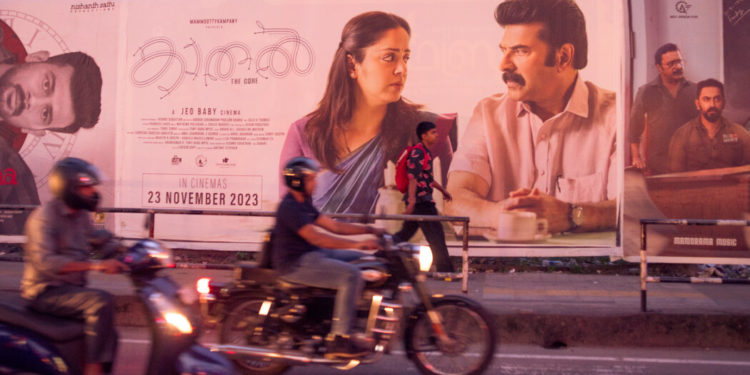By THE NEW YORK TIMES
It is an Indian film without song and dance. The lovers don’t share a word, their main interaction a fleeting moment of eye contact in the monsoon rain. There are no car chases and no action stunts. The men are vulnerable. They cry.
And yet when “Kaathal — The Core,” a film in the Malayalam language about a closeted middle-aged politician, was released last month, it became a commercial success as well as a critical one. Cinemas in the southern state of Kerala, home to the Malayalam film industry and about 35 million people, sold out. That one of South India’s biggest stars had taken on the role of a gay man, and portrayed him so sensitively, started conversations well beyond Kerala.
Outside India, the country’s cinema is often equated with the glamour and noise of Bollywood, as the dominant, Hindi-language film industry is called. But in this vast nation of 1.4 billion, there are many regional industries whose styles are as distinct as their languages. “Kaathal” is the latest example of what Malayalam cinema has become known for: progressive stories that are low-budget, nuanced and charged with real human drama.
What distinguishes it from other regional cinemas, observers say, is that it has found a rare balance. Increasingly, Kerala audiences turn out as enthusiastically for these modest Malayalam-language stories of everyday people as for high-adrenaline blockbusters, often imported from other parts of India.
The result has been commercial success for the kind of low-key films that are seen elsewhere as experimental, more often than not relegated to festival circuits or sent straight to streaming platforms.
“We have a wonderful audience here,” said Jeo Baby, “Kaathal’s” director. “The same audience creates success for mass movies and at the same time for small movies and comedies.”
The subtle storytelling of Malayalam cinema has gotten more exposure in the post-Covid era. The rapid expansion of streaming services in India that began with the pandemic, and the competition for new content, has created space for regional cinema to find national and global audiences.
Bollywood, for its part, initially struggled to lure audiences back to theaters after Covid. Its recent high-grossing films have mostly relied on well-worn storylines, injected with more violence, increasingly slick visual effects and heavy doses of populism and propaganda. Superstars still dominate Bollywood, and an environment of censorship and self-censorship prevails.
“There is a lot more intervention there,” said Swapna Gopinath, a professor of film and culture studies at the Symbiosis Institute of Media and Communication in the city of Pune. “That makes it difficult for independent cinema to thrive.”
Until fairly recently, Ms. Gopinath said, Malayalam cinema was no different: It featured movies with big-name actors and recycled storylines, which often celebrated traditional, patriarchal values.
But that changed about a decade ago, after several boundary-pushing films by young directors had popular success. It was an affirmation that audiences in Kerala, which leads India in living standards, were open to experimental, nuanced content.
“From there onward, the scape of cinema changed as far as Malayalam cinema is concerned,” Ms. Gopinath said. “We started having films that talked about gender, about caste.”
A study of recent Malayalam films by Ormax Media, a consulting firm, found that three-quarters of them were small-town dramas whose protagonists were ordinary people, not larger-than-life heroes. The subjects tend to be modest and local — like the messy politics of broadening a small village road when everyone has a stake, or a priest at a new chapel who is haunted by the space’s history as a soft-porn cinema.
Mr. Baby, who directed “Kaathal,” is known for focusing on what often goes unnoticed in daily life. He first gained wide recognition two years ago with “The Great Indian Kitchen,” a meditation on the toll of misogyny in a family.
When the writers of “Kaathal” approached him with their story about the struggles of a closeted gay man, the director said he thought of just one actor for the role: Mammootty, a 72-year-old star with a large following in Kerala.
He plays Mathew Devassy, a retired, married bank clerk with a daughter in college. As he prepares to run in the village elections, his wife, played by the actress Jyotika, files for divorce because he has known throughout their marriage that he was gay, and has quietly had a male lover. The film has courtroom scenes, but it centers on the silences of the household, the rumors circulating in the village and Mathew’s inner struggle.
Mammootty’s decision to both star in and produce “Kaathal” helped to keep the film, and the subject it tackles, in the public eye, Mr. Baby said.
India decriminalized gay sex just five years ago, and its Supreme Court recently rejected a petition to legalize same-sex marriage, though it said same-sex relationships should be respected.
Jijo Kuriakose, an artist and activist in the city of Kochi in Kerala, said “Kaathal” had dealt sensitively with the social pressures that force many gay Indians to live parallel lives.
He said he had nearly married a woman about a decade ago, but instead came out to his family on the night of his engagement. His parents are still urging him to marry a woman, he said.
“‘OK, you are homosexual, we understand, but get married to a woman’ — it is a standard response for many years,” Mr. Kuriakose said.
The film has prompted many discussions in Kerala and beyond about how caste, class, gender and religion affect the choices available to the characters. Sreelatha Nelluli, a poet and translator who recently got out of a marriage with a closeted gay man, said the film had hit especially close to home.
“I loved your expressions, constantly confused and almost scared.” Ms. Nelluli wrote to Mammootty and Mr. Baby in an open letter. “You have understood and embodied this man.”
But while praising the film for lending “voice to the voiceless,” Ms. Nelluli said it had made the process of coming out appear faster and simpler than is possible in reality. After her husband told her the truth, she said, 15 more years passed before they shared it with the rest of the family.
“The moment he came out to me 15 years ago, I too entered that closet with him,” she wrote.
For Mr. Kuriakose, this subtle Malayalam film was perhaps at times too subtle. He was disappointed that it never showed the intimacy of the male lovers, and that their story, unlike heterosexual romances in most Indian films, was not given a beginning. At no point in the film do we learn how the two men met.
“Some people really enjoyed the subtle expressions,” Mr. Kuriakose said. “I being a loud person, I love to see ‘not subtle’ expressions.”
Deepa Kurien contributed reporting.







Discussion about this post